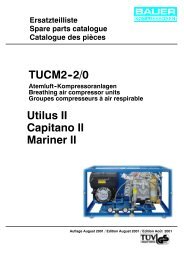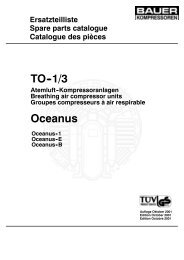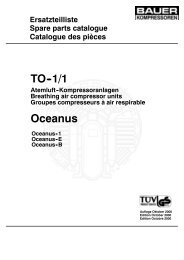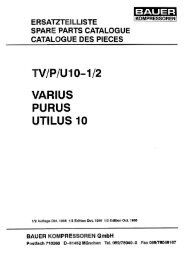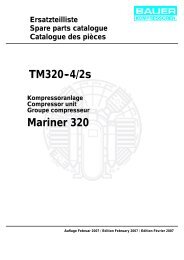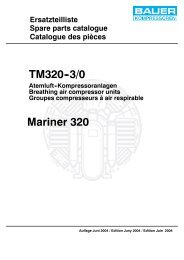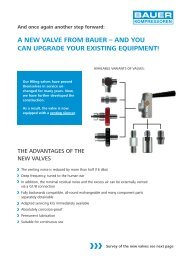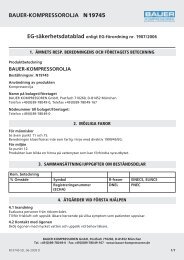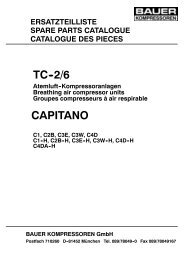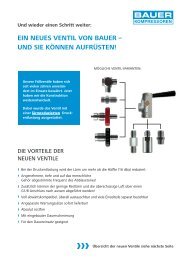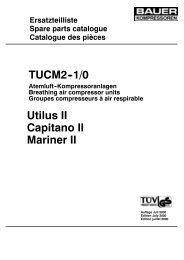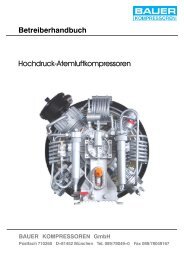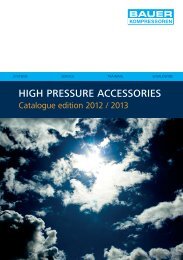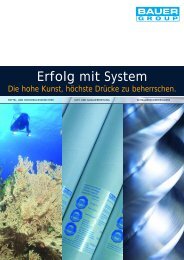Operator's Manual High Pressure Breathing Air Compressors
Operator's Manual High Pressure Breathing Air Compressors
Operator's Manual High Pressure Breathing Air Compressors
Create successful ePaper yourself
Turn your PDF publications into a flip-book with our unique Google optimized e-Paper software.
Operator’s <strong>Manual</strong><br />
These pressure vessels may also be used under conditions<br />
of changing operating pressure. The pressure may vary between<br />
the atmospheric and the maximum admissible operating<br />
pressure.<br />
The pressure vessel documentation and the appropriate<br />
notes in the operating manual particularly characterise vessels<br />
of this type as being adequate for dynamic loads. In the<br />
technical information for these vessels you will find specifications<br />
concerning their permissible operating period.<br />
Due to the variation ofthe operating pressure, these vessels<br />
are subject to a so--called dynamic load, which puts the vessels<br />
under great stress. The change between two different<br />
pressures is called a load change or cycle. In the technical<br />
information for these vessels you will find specifications<br />
concerning the permissible number of cycles depending on<br />
the fluctuation of the operating pressure.<br />
Having reached half the permissible number of cycles, the<br />
vessel has to be submitted to an internal check, in which the<br />
critically stressed areas of the vessels are examined by<br />
means of suitable testing methods, in order to ensure the<br />
operating safety.<br />
After having reached the total permissible number of load<br />
cycles, the vessel must be exchanged and scrapped.<br />
Record the number of load cycles in writing if you do not<br />
have an automatic cycle--counter.<br />
We recommend that aluminium vessels should be exchanged<br />
after 15 years at the latest.<br />
Please pay attention to and follow these measures, for your<br />
own safety and that of you employees and customers!<br />
In order not to unnecessarily load the pressure vessels additionally,<br />
the non--return valves, that are meant to avoid a<br />
drop in pressure, and also the pressure maintaining valves,<br />
which should reduce big pressure fluctuations as well,<br />
should be checked regularly for internal and external tightness<br />
and functionality.<br />
• Check the pressure vessels regularly on the inside and outside<br />
for damage from corrosion.<br />
• Be particularly careful with second--hand pressure vessels,<br />
when their previous operating mode is not specifically clarified.<br />
2.5. SAFETY REGULATIONS (EC; partly Germany,<br />
only)<br />
A compressor is identified by German law as being a filling system<br />
if pressure cylinders are filled by the system, especially<br />
when these cylinders are made available for third parties. The<br />
start--up and operation of compressor systems for use as filling<br />
stations is governed by the following regulations:<br />
a - <strong>Pressure</strong> vessel directive (Directive 97/23/EC) of<br />
29.05.1997<br />
b - Operating safety regulations (BetrSichV) of 27.09.2002<br />
c - Machine safety law (GSG) as of 11.05.2001<br />
d - 14th regulation to machine safety law (14. GSGV - pressure<br />
vessel regulation) of 03.10.2002<br />
e - Technical regulations for pressure gases (TRG 400, 401,<br />
402, 730).<br />
If a high pressure compressor is used for filling pressure vessels<br />
or for the supply of pneumatic systems, the following regulations<br />
apply:<br />
f - Accident Prevention Regulations (UVV):<br />
• UVV compressors (VBG 16).<br />
Copies of the above regulations are available through the usual<br />
outlets, e.g. in Germany from:<br />
Carl Heymanns Verlag<br />
Luxemburger Str. 449<br />
50939 Köln<br />
Beuth--Vertrieb GmbH<br />
Burggrafenstr. 4 -- 7<br />
10787 Berlin<br />
The manufacturer has complied with all applicable regulations<br />
and the unit is prepared accordingly. If desired, we offer at our<br />
Munich site a partial acceptance test according to § 14 Betr-<br />
SichV. Please contact our Technical Service Department with<br />
regard to this. They can also supply our leaflet “IMPORTANT<br />
NOTES FOR CERTIFICATION”.<br />
According to the operation safety regulations (BetrSichV), all<br />
compressor units which will be used as filling stations must undergo<br />
an acceptance test by a professional at their location before<br />
bringing them into service. If pressure vessels (bottles) are<br />
to be filled by the compressor for a third party then the appropriate<br />
permission must be obtained from the responsible authority<br />
before the acceptance test. As a rule, this is the factory inspectorate.<br />
The procedure for obtaining permission is according to<br />
TRG 730, guidelines for permission to set up and operate filling<br />
stations. The test certificates and documents delivered with the<br />
compressor are important and may be requested during the<br />
procedure for obtaining permission. In addition, the documents<br />
belonging to the unit are important for recurrent inspections and<br />
should therefore be carefully kept.<br />
Inspections in accordance with the regulations for prevention of<br />
accidents will be carried out by the manufacturer orby a specialist.<br />
No guarantees whatsoever are valid for damage caused or favoured<br />
by the non--consideration of these directions for use.<br />
We strongly emphasize these regulations.<br />
13



